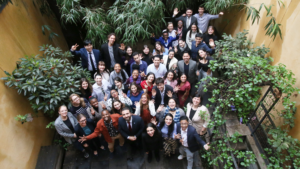Once a year we celebrate the International Day of Friendship, which recognizes the role of friendship in building peace amongst people of different cultures. Friendship serves as a bridge to maintain peace and combat prejudices, where solidarity and mutual understanding are at the foundation of our existence as human beings. In addition to contributing to the development of societies and cultures, friendship is important for the development of youth. Youth needs to carry society forward while engaging in activities with young people from other cultures for the sake of building a multicultural awareness, international understanding and respect for diversity. In order to understand friendship we need to go back to the roots of the development of culture and civilization. Rather, let’s go back to the source in order to fathom the depths of being a friend and have a broader view on the topic.

Philia
Back in ancient times, Greek philosophers believed that there are eight kinds of love, those being eros, philia, ludus, agape, pragma, philautia, storge and mania. Today, the ones people refer to are eros, storge, philia and agape. Those are the most present kinds of love in interpersonal relationships because they reflect romantic, family, friendly and selfless love. The most sublime among them is the agape, and the others are worth more if they have her traits of selflessness and nobility. Nowadays, the philia, known as friendly love, is placed at the center of relationships between friends. Perhaps the right attitude towards the other person is an attitude of acceptance and understanding that breeds trust, which leads to friendship. Removing the barriers of non-acceptance of cultural diversity can awaken awareness which marks human progress and enriches societies and cultures. Having an open-minded attitude facilitates fraternal relationships between people.
A stranger is a friend we haven’t met yet
Building friendships between people of different cultures and nations begins with building trust with the first person next to us. However, friendly love known as philia, signifies something much deeper and more complex than an ordinary friendship. It is the kind of love between two strangers who had become friends, which further grew into a bloodless brotherhood. In such relationships, the depth and authenticity of both persons are expressed freely. When we are guided by the quote “the stranger is a friend we have not yet met’’ then the people next to us as well as our acquaintances are the ones we need to trust in order to call them friends. The people we choose in our intimate circles actually become our brothers and sisters. The longing for philia and true friendship requires a different attitude towards the other person, which is conditioned by knowing oneself. Building friendships between nations and cultures begins with giving trust to those around us and as the circle spreads further and further, the barriers of cultural differences are removed.

What is “friendly love” exactly?
What exactly is friendly love and does having a friend lead to knowledge of what it means to be a friend? Why do we invite some people into our lives and want to build relationships, and others we don’t even notice? What does true and authentic friendship require? These are questions we all asked ourselves at some point in life. They came with the question of who I am and who the other is. Does the other one reflect what I recognize in myself insufficient amount that I want to build a friendship with them? We are not happy when our relationships are not healthy. We do not feel fulfilled when we do not have people around us to share our ups and downs, joy and sorrow with. If we build relationships only based on similarities with others, then the desire to make friends with people from other cultures can at first seem contradictory, but if we look deeper into ourselves we will see that ‘’the other’’ has many similarities and one of them is inalienable dignity.
The United Nations does not exist without united communities and societies
If we imagine time as the line below which every man is connected and the way he is connected depends on his values, upbringing and the complexity of the inner world, we will see that stepping through time leads to the development of the individual. The maturation extends as much as we let other people go with an initial attitude of understanding and accepting diversities. Whether they belong to the same or different cultures. The other person becomes our friend when we both become ready to walk together and be a positive force of the world. It is only when our life paths and vocations intertwine we can become ‘’friends for life’’. Through small connections with others on which we learn to build friendships, all the way to the bigger ones between governments and nations. The United Nations does not exist without united communities and societies, nor do they exist without a united attitude of acceptance and understanding towards every human being. This positive attitude towards the other leads to friendship and showcases its importance at the international level. Friendship is not only the highest achievement of a person, but the way in which the construction of the world was originally conceived. The touch of sublimity begins with extending your hand to the person next to you.
[su_divider top=”no” margin=”0″]
Published: March 21, 2022
Written by: Dora Kujek, WYA Europe intern







